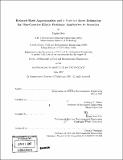Reduced basis approximation and a posteriori error estimation for non-coercive elliptic problems : applications to acoustics
Author(s)
Sen, Sugata, 1977-
DownloadFull printable version (15.05Mb)
Other Contributors
Massachusetts Institute of Technology. Dept. of Civil and Environmental Engineering.
Advisor
Anthony T. Patera.
Terms of use
Metadata
Show full item recordAbstract
Modern engineering problems often require accurate, reliable, and efficient evaluation of quantities of interest, evaluation of which demands the solution of a partial differential equation. We present in this thesis a general methodology for the predicition of outputs of interest of non-coercive elliptic partial differential equations. The essential ingredients are: (i) rapidly convergent reduced basis approximations - Galerkin projection onto a space WN spanned by solutions of the governing partial differential equation at N selected points in parameter-time space; (ii) a posteriori error estimation - relaxations of the error-residual equation that provide rigorous and sharp bounds for the error in specific outputs of interest; and (iii) offline-online computational procedures - in the offline stage the reduced basis approximation is generated; in the online stage, given a new parameter value, we calculate the reduced basis output and associated error bound. The operation count for the online stage depends only on N (typically small) and the parametric complexity of the problem; the method is thus ideally suited for repeated, rapid, reliable evaluation of input-output relationships in the many-query or real-time contexts. We consider the crucial ingredients for the treatment of acoustics problems (cont.) - simultaneous treatment of non-coercive (and near-resonant), non-Hermitian elliptic operators, complex-valued fields, often unbounded domains, and quadratic outputs of interest. We introduce the successive constraint approach to approximate lower bounds to the inf-sup stability constant, a key ingredient of our rigorous a posteriori output error estimator. We develop a novel expanded formulation that enables treatment of quadratic outputs as linear compliant outputs. We also build on existing ideas in domain truncation to develop a radiation boundary condition to truncate unbounded domains. We integrate the different theoretical contributions and apply our methods as proof of concept to some representative applications in acoustic filter design and characterization. In the online stage, we achieve O(10) computational economies of cost while demonstrating both the rapid convergence of the reduced basis approximation, and the sharpness of our error estimators ([approx.] O(20)). The obtained computational economies are expected to be significantly greater for problems of larger size. We thus emphasize the feasibility of our methods in the many-query contexts of optimization, characterization, and control.
Description
Thesis (Ph. D.)--Massachusetts Institute of Technology, Dept. of Civil and Environmental Engineering, 2007. Includes bibliographical references (p. 251-261).
Date issued
2007Department
Massachusetts Institute of Technology. Department of Civil and Environmental EngineeringPublisher
Massachusetts Institute of Technology
Keywords
Civil and Environmental Engineering.